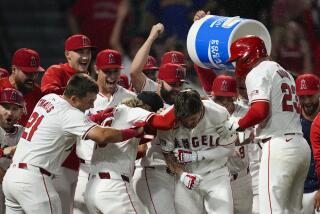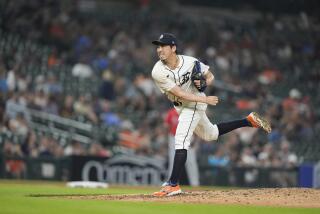Element of Success Remains Elusive for Angels
- Share via
SEATTLE — The Angels have taken extra batting practice and they’ve gone without batting practice. They’ve held pregame meetings with players and postgame meetings with coaches. Some players have shaved beards; others have let facial hair grow. They’ve worn blue jerseys and gray ones.
What’s next, some kind of clubhouse ritual in which the Angels attempt to exorcise the demons that have invaded their bat rack?
If they were convinced that would end their slump, the Angels would scour the Yellow Pages for the nearest witch doctor. At this point, extreme measures might be necessary.
The Angels lost to the Seattle Mariners, 5-2, before 39,274 at Safeco Field on Saturday. It was their seventh loss in eight games. They managed seven hits--two of them solo home runs by Garret Anderson and Shawn Wooten--and fell seven games behind the first-place Mariners in the American League West.
In their last nine games, the Angels have scored 22 runs on 56 hits for an average of 2.4 runs and 6.2 hits. Their two top hitters, Darin Erstad and Troy Glaus, are struggling, Erstad going four for 35 in the last nine games and Glaus going two for 23 in the last six games.
The Angels were hitless in eight at-bats with runners in scoring position Saturday and are one for 17 with runners in scoring position in the first three games of a four-game series. They are in danger of being swept in a four-game series by the Mariners for the first time in franchise history.
“It will turn around with a few early runs and a laugher,” Angel first baseman Wally Joyner said. “But I think now, a two-run victory would be a laugher.”
This one turned into a laugher for the Mariners in the third inning when they loaded the bases with two outs and John Olerud hit a towering home run that cleared the right-field wall. It was his seventh career grand slam and the first one given up by Angel left-hander Jarrod Washburn.
Before Olerud’s homer, Washburn had a 1-2 count on Edgar Martinez, but not wanting to make a mistake against one of baseball’s best hitters, Washburn threw three consecutive balls for a walk. Olerud then drilled a 1-2 fastball on the inside half of the plate for a 4-0 lead.
“In the past, Olerud has hit me well, but most of his hits have gone the other way,” Washburn said. “I thought I’d go hard and in on him today, and it worked the first at-bat [when Olerud flied out]. But he obviously made the adjustment his second at-bat.”
A four-run deficit used to be nothing for the Angels, who had 37 come-from-behind victories last season. But the way they’re hitting this season, a four-run deficit is an obstacle of Mount Rainier-like proportions. They never got closer than three runs to the Mariners.
“We’ve just had a tough time getting guys on, getting them in scoring position and getting them in,” Manager Mike Scioscia said. “It’s different with each hitter, but it’s affecting everyone. Some guys are opening the strike zone up; some are being too selective. We haven’t settled into a comfort level where we’re getting good swings.”
They’re getting a lot of looks, and they’re not good. Of the Angels’ 22 strikeouts in the last three games, 10 have come on called third strikes. Joyner believes Angel hitters aren’t the only ones expanding the strike zone.
“There’s not one person in this clubhouse who wants to be a complainer, but in my opinion, we’ve had some very questionable calls go against us at the plate,” Joyner said. “I think [the fact we’ve taken so many called third strikes] shows a lot.
“Erstad has had pitch after pitch called against him, and I think he knows the strike zone. Some of these pitches are not even [close]. It’s funny. When a player has a bad day, it bothers him. I’m wondering if the same is true for umpires.”
Erstad, the Angels’ leadoff batter, took a called third strike in the ninth inning on an Arthur Rhodes curve that appeared to be at least six inches off the outside corner. But when asked about the umpires, Erstad declined comment.
“You’ve still got to hit them no matter where they’re throwing them,” Erstad said. “We’re struggling as a team, and it starts at the top. It’s my job to get on base and I’m not doing that.”
More to Read
Go beyond the scoreboard
Get the latest on L.A.'s teams in the daily Sports Report newsletter.
You may occasionally receive promotional content from the Los Angeles Times.







